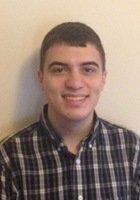I believe that every child has the ability to reach their potential. Many are even able to excel far beyond what others thought possible of them. As teachers, it is our job to create an environment where they are directed, encouraged, and supported in whatever endeavor they choose to pursue. This is why the classroom should be a space in which the student feels comfortable enough to express themselves. I want to teach so that I can help students gain new perspectives, both externally and internally, and help them grow intellectually. My subject area that I teach is English. My objectives for students are that they develop and refine their questioning and critical thinking skills while, perhaps, gaining a love of reading. These two skills will help students later on in their academic life and in their career. By being able to think critically about an area, students will be able to take problems apart to find different ways of solving it. Teaching them to question everything will help to broaden their minds and understand that there are many perspectives in this world. There are many areas in life where there will be multiple scenarios for students to examine. If the students understand that there is the possibility for more than one answer, they will be more likely to succeed. I believe in the constructivist model of education. A student, who is actively learning, by using their hands or moving around, is more likely to remember what is going on more than a passive learner. I am very much behind the idea of getting kids up and moving in the classroom. I plan on offering more hands on work, group discussions, and opportunities to become more independent learners. A student who is taught to learn independently will have a better chance later on. I believe that if the students are interested and excited, the learning will come naturally. One of my goals is to instill critical thinking in my students by debates, open discussion, and scenario building. My role will be one of facilitator. I will use scaffolding, modeling, and coaching to push my students towards their potential. As each student learns differently, this approach will allow me to tailor the lessons to the needs of the students. The more the student is engaged in the subject at hand, the more knowledge they gain from it. Sitting at a desk and passively listening to the teacher lecture is something that we as educators need to get away from. When the entire person is involved with the learning, they are able to gain so much more from it. I think that it is not enough for a student to just read, but they must be able to use what they have read in different situations. They should be introduced to critical thinking as early as possible. Critical thinking is an important part of the learning process. A student should not just accept what they are given but should instead look at it from all angles, learn how it is composed, and be able to apply what they learned in other areas easily. Every student has the ability to do this. One aspect in the constructivist classroom that I believe is important is differentiation. Differentiation allows us as educators to change the lesson in order to best serve the student. By differentiating the lessons, students of different ability will be able to participate and gain an understanding of the material. Along with this, I will be leading class discussions and then gradually transferring the power to the students towards more group discussions, i.e. my moving from that of leader to facilitator. This will allow me to model for the students the type of discussions that I am looking for. Giving students an idea of what is expected ensures students ability to gain a deeper understanding from their own discussions. They will understand what they should be contributing and how to keep themselves and group-mates on task. Students will be evaluated on their discussions, projects, and a few formative assessments. By conferencing with students, both independently and as groups, I will be able to see where they are in relation to where they should be. This is more personal than simply giving the student feedback written on a piece of work. Conferencing will also allow the students to make me aware of any issues they believe they are having. This then allows them to grow as independent learners. I hope to encourage, direct, and foster a love of independent learning in all my students. This will not only help them out in my class, but also later on in their lives. That is why I believe that constructivist learning is the method to use. It allows students to create a strong foundation through the use of modeling and support that will help them become more independent learners.



